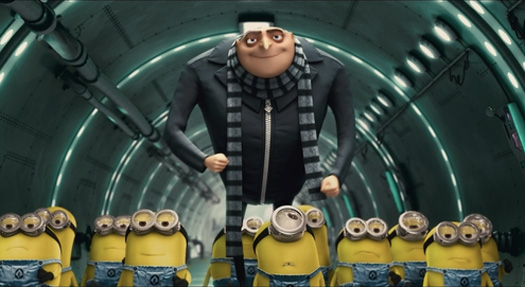
Mr. Gru and his Minions
Despicable Me, the new CGI-animated feature from Universal, took in over 60 million dollars at the box office on its opening weekend. The New York Times reporter A.O. Scott panned it. But that’s not why you should see it: you should see it because it is, in just about every way, brilliant.
With a Russian accent worthy of Bela Lugosi, Steve Carell’s hook-nosed Mr. Gru is at the center of a story that’s much more than a movie for children. Woven through the basic plot are a series of fascinating relationships, starting with Dr. Neferio, Gru’s elderly wizard of a sidekick (voiced by Russell Brand) and continuing with Will Arnett as his larger-than-life banker. Gru’s mother (Julie Andrews, who, in a puzzling twist, has a French accent) appears in frequent flashbacks: dressed to match the avocado appliances in what surely framed her Apollo-landing-era kitchen, she’s present but just barely so, ignoring her space-obsessed child and replying stonily — when asked if she thinks he might one day go into space — that she doesn’t think they’re sending monkeys there any more.
Despicable Me, the new CGI-animated feature from Universal, took in over 60 million dollars at the box office on its opening weekend. The New York Times reporter A.O. Scott panned it. But that’s not why you should see it: you should see it because it is, in just about every way, brilliant.
With a Russian accent worthy of Bela Lugosi, Steve Carell’s hook-nosed Mr. Gru is at the center of a story that’s much more than a movie for children. Woven through the basic plot are a series of fascinating relationships, starting with Dr. Neferio, Gru’s elderly wizard of a sidekick (voiced by Russell Brand) and continuing with Will Arnett as his larger-than-life banker. Gru’s mother (Julie Andrews, who, in a puzzling twist, has a French accent) appears in frequent flashbacks: dressed to match the avocado appliances in what surely framed her Apollo-landing-era kitchen, she’s present but just barely so, ignoring her space-obsessed child and replying stonily — when asked if she thinks he might one day go into space — that she doesn’t think they’re sending monkeys there any more.
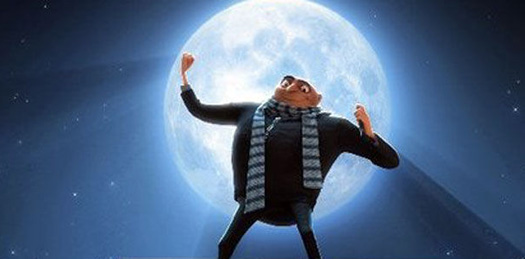
Mr. Gru
Gru’s more pressing foil not only aspires to supplant him as the world’s most menacing villain: he’s also competing against him for a bank loan. And here, let me say that not since Edna Mode’s turn in The Incredibles has there been a character who so magnificently brought design to the screen like Vector (neé Victor), who lives in a bright white modernist bubble where he hides behind state-of-the-art technology with a giant pet shark and no shortage of junk food. His signature color is orange — a loose reference to that beautiful, circa-1960 Olivetti orange that briefly appeared on fashion runways during the Andre Courrèges era in the 1970s and which, when paired with white, still recalls a kind of space-age wonder. Curiously, unlike Syndrome (the ginger-haired villain in The Incredibles) Vector’s hair is not orange. It’s black and fringy — think Bob Denver as Maynard G. Krebs — which bounces along against his bright orange warm-up suit (“Its not pajamas!” he insists) while he attacks from inside his modernist fortress, poking little orange buttons and sending scores of targeted missiles zooming through the air.
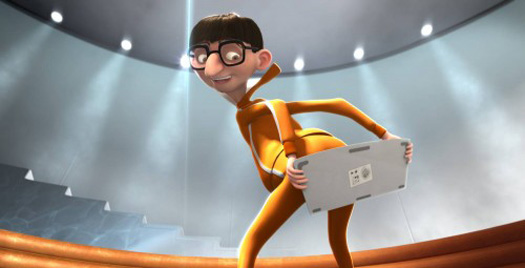
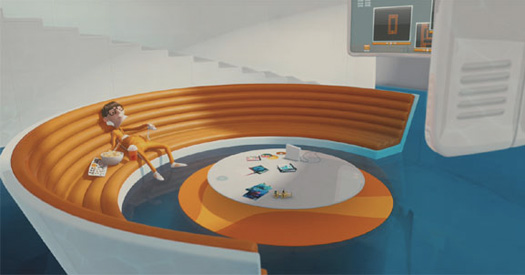
Vector
Gru himself has a Eurotrash quality: scarf lazily draped around his neck, oversized turtleneck, skinny black pants and long pointy shoes. He could be any Eastern European architect or designer you know — armed with dastardly schemes and the armies of support staff to enact them, of course. And here, the armies themselves, called “minions” in the film, represent an entire new genre of visual form and character development. Optimizing the slow burn of Pixar’s Luxo Jr., they careen across the screen like burlesque honeybees. Part Oompa Loompa, part Lego block, minions are shape-shifting miniature yellow robots who multitask with beguiling skill. (In one scene, Gru shakes one until he snaps and self-illuminates: minion as glow stick, or in this case, instant flashlight.) They clobber each other with a Punch and Judy pokiness, make silly noises by the water cooler, and waltz about with the mindless intentionality of an Energizer bunny. But what really makes them irresistible is their mysterious language: minions seem to babble interminably in a kind of accelerated patter that sounds like a cross between Spanish, Japanese and your computer’s Zarvox setting upped to maximum warped speed. (Toddlers in minion costumes will be everywhere this Halloween: mark my words.)
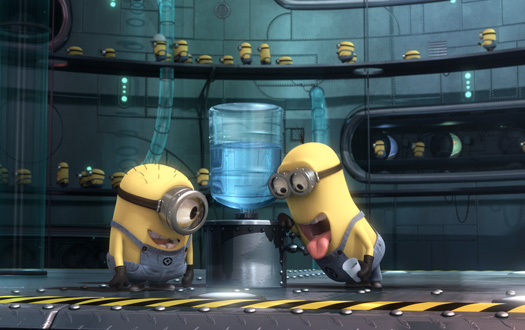
Gru himself has a Eurotrash quality: scarf lazily draped around his neck, oversized turtleneck, skinny black pants and long pointy shoes. He could be any Eastern European architect or designer you know — armed with dastardly schemes and the armies of support staff to enact them, of course. And here, the armies themselves, called “minions” in the film, represent an entire new genre of visual form and character development. Optimizing the slow burn of Pixar’s Luxo Jr., they careen across the screen like burlesque honeybees. Part Oompa Loompa, part Lego block, minions are shape-shifting miniature yellow robots who multitask with beguiling skill. (In one scene, Gru shakes one until he snaps and self-illuminates: minion as glow stick, or in this case, instant flashlight.) They clobber each other with a Punch and Judy pokiness, make silly noises by the water cooler, and waltz about with the mindless intentionality of an Energizer bunny. But what really makes them irresistible is their mysterious language: minions seem to babble interminably in a kind of accelerated patter that sounds like a cross between Spanish, Japanese and your computer’s Zarvox setting upped to maximum warped speed. (Toddlers in minion costumes will be everywhere this Halloween: mark my words.)

Minions
Okay, so there are some annoying things about the film, too, including a trio of miniature girls who look like Weebles, and a few too many pointedly feel-good morality moments for my taste. Kristen Wiig, in the role of Miss Hattie, is way underused, and the music, while spirited, feels miscast. There are too many kittens and unicorns and way too much ballet. But wait! Vector’s spaceship looks like what Knoll might have issued if given the chance to strut for NASA, and there are some utterly brilliant details that you’ll miss if you blink — the crackberry-dazed anorexic power mother in the front row at the dance recital, for instance, or the skeweringly shrewd interiors (don’t miss the signage) at the aptly-named “Bank of Evil.” There’s the dangling, cheapie car freshener in Gru’s car — an armored tank that makes a Hummer look like a rickshaw — and enough trompe l’oeil monuments and recycled grenades to make your head spin. It’s dark. It’s dastardly. And there’s good design! Really: how can you resist?
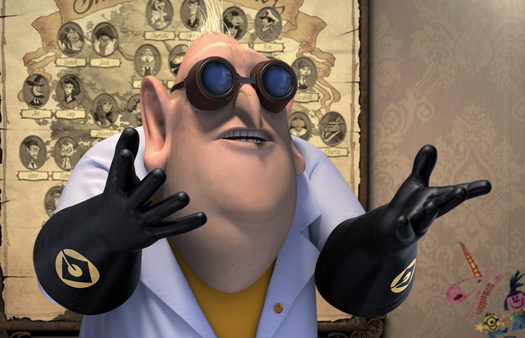
Okay, so there are some annoying things about the film, too, including a trio of miniature girls who look like Weebles, and a few too many pointedly feel-good morality moments for my taste. Kristen Wiig, in the role of Miss Hattie, is way underused, and the music, while spirited, feels miscast. There are too many kittens and unicorns and way too much ballet. But wait! Vector’s spaceship looks like what Knoll might have issued if given the chance to strut for NASA, and there are some utterly brilliant details that you’ll miss if you blink — the crackberry-dazed anorexic power mother in the front row at the dance recital, for instance, or the skeweringly shrewd interiors (don’t miss the signage) at the aptly-named “Bank of Evil.” There’s the dangling, cheapie car freshener in Gru’s car — an armored tank that makes a Hummer look like a rickshaw — and enough trompe l’oeil monuments and recycled grenades to make your head spin. It’s dark. It’s dastardly. And there’s good design! Really: how can you resist?

Dr. Neferio
